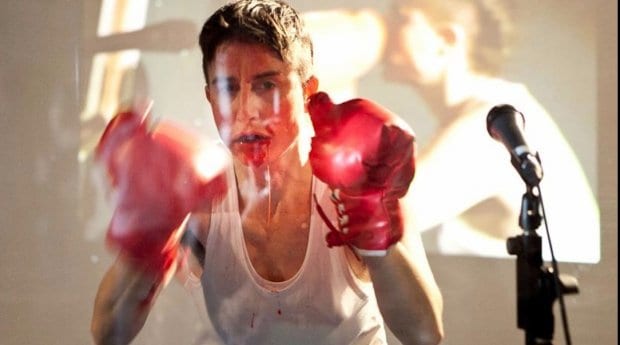Whether posing on a street corner as the pregnant Virgin Mary or leading an army of puppet vaginas, anuses and “fantasy holes” down major city streets, Coral Short’s artwork packs a punch — sometimes literally.
To help kick off this summer’s Queer Arts Festival (QAF) in Vancouver, she will reproduce her 2013 piece of performance art Stop Beating Yourself Up in which Short literally beats herself up in front of an audience for an hour.
“I wanted it to be a visceral call to gentleness for queers,” she tells Daily Xtra. “I feel like queers are extremely hard on themselves and I just wanted the intensity of the stuff we do internally to be physically [expressed] externally.”
Short is a Montreal-based multi-disciplinary artist who uses textiles, video and often her own body as her canvas.
As part of the festival’s theme this year, Trigger: Drawing the Line in 2015, QAF is presenting art that tests the personal limits of audience members and questions how far is too far.
“This piece is really problematic. I think it’s the most problematic piece I’ve ever done, which is maybe why [artistic director SD (Shaira) Holman] wanted it,” says Short.
This will be her second and final time performing the piece, with some modifications since 2013. She has reduced the running time (which was originally three hours) and will now have a paramedic on hand.
“I hope that audiences will take away that protective feeling they have for me and they will put it into their own bodies, and they will be more gentle and tender with their own bodies.”
At the festival, Short will also be curating a selection of films by artists from across North America who make art that will potentially (likely, according to Short) trigger some viewers.
“If you don’t like seeing someone having sex with a heart, then you can leave and come back,” she says.
“I know Vancouver’s culture is very PC compared to the east coast, so it will be very interesting to see which films people walk out of. If they walk out of any films at all,” she adds.
Short says this kind of bill has never been presented before. “I think people have shied away from trigger warnings for so long,” she says.
“If they’re triggered by overtly sexual things or body fluids or claustrophobia or they’re really strong vegetarians, maybe they shouldn’t come, but I think everybody can handle it,” she says. “I also really encourage people to walk out, enjoy some popcorn, go pee, have a drink, and come back. I want it to be a culture of comfort in the cinema.”
Coral Short will present Stop Beating Yourself Up at the Queer Arts Festival’s opening gala on Thursday, July 23 (doors open at 7pm, entrance by donation), and her Trigger Warning video curation on Monday, July 27 at 7:30pm (tickets $12 at queerartsfestival.com).
Both presentations will take place at the Roundhouse Community Centre, 181 Roundhouse Mews, Vancouver. For more information go to queerartsfestival.com

 Why you can trust Xtra
Why you can trust Xtra


